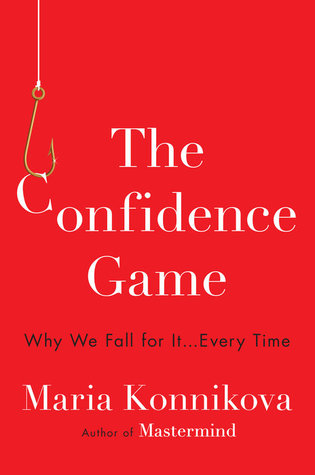More on this book
Community
Kindle Notes & Highlights
Their genius lies in figuring out what, precisely, it is we want, and how they can present themselves as the perfect vehicle for delivering on that desire.
Give us a compelling story, and we open up. Skepticism gives way to belief.
Transition is the confidence game’s great ally, because transition breeds uncertainty.
When it comes to cons, the exact same principle holds. The best confidence games remain below the radar. They are never prosecuted because they are never detected.
The behavioral norms of a company, culture, or setting—how it is and isn’t acceptable to act—must be communicated clearly and unequivocally.
It’s not so much “monkey see, monkey do” as “monkey think someone might see, so acts accordingly.”
The pattern isn’t altogether uncommon. USIS, the contractor that used to supply two thirds of the security clearances for much of the intelligence community, appears to have spiraled from a few faulty checks to thousands. At first, it seemed like one rogue employee had submitted sixteen hundred falsified credit reports; one bad apple does not a rotten tree make. But by January 2014, it had become clear that it wasn’t a bad apple. According to the Department of Justice’s suit, that was but the tip of a much larger scandal: the company had faked well over half a million background checks between
...more
When Markowitz and Hancock tested whether the false publications differed linguistically from the genuine ones, they found one consistent tell: the deceitful papers used far more words related to the nature of the work itself—how and what you measure—and to the accuracy of the results. If there’s not much substance, you “paper” more: you elaborate, you paint beautiful prose poems, and you distract from lack of substance. (Who doesn’t remember doing a bit of the same on a college essay, to hide evidence of less than careful reading?)
Size someone up well, and you can sell them anything. A magic crystal. An Egyptian curse. The Eiffel Tower. Fail to do so, and the most elaborate or attractive master plan will fall on deaf ears.
“The behavior of other people is in many ways analogous to our own, and we suppose that it must have analogous causes.”
In one series of studies, Epley and his colleagues found that people were far slower to discern a different perspective from their own, and that under time pressure they were unlikely to do so at all.
We never learn to be expert people-readers because that expertise can backfire spectacularly. Why form accurate judgments when the inaccurate ones make our lives far more pleasant and easy?
In a follow-up, the researchers discovered something else: people were more likely to give money to a stranger asking for a donation after they’d heard a police whistle when they’d been jaywalking. As they reached the other side of the street, a student would approach them and ask for money. She’d either give no justification (“Excuse me, would you please give us some money?”), a bogus justification (“Excuse me, we are collecting money. Would you please give us some, because we have to collect as much money as possible?”), or a real justification (“Excuse me, we are from the Students for the
...more


